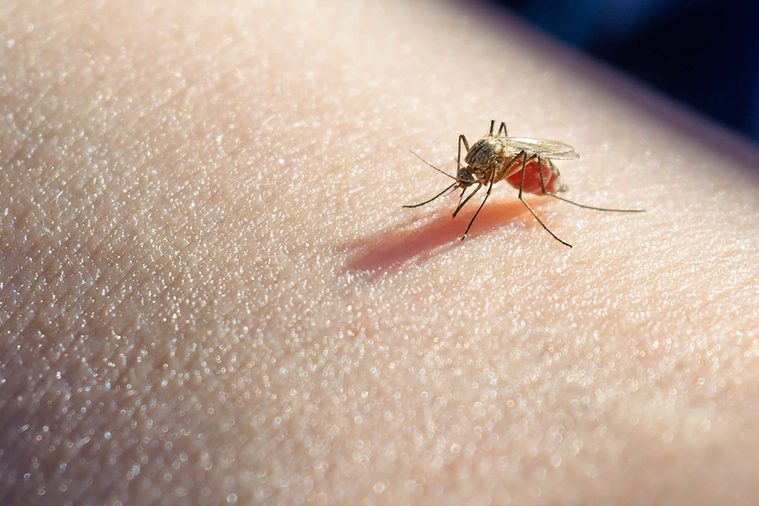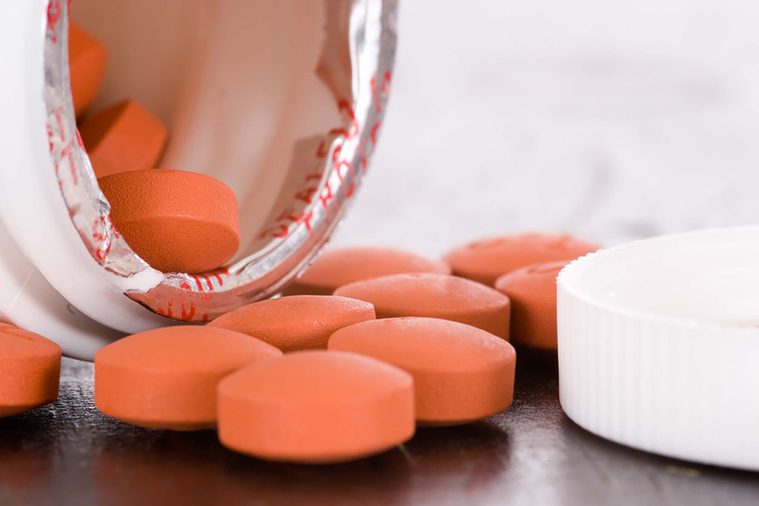
Staying up-to-date is essential
Vaccines save lives. Brendan Anzalone, MD, the president and chief medical officer of AeroMD Air Ambulance says peace of mind is something you can’t package in a carry-on or checked bag, but it is something you can have if you meet with your doctor before takeoff. “A meeting with your personal physician to go over your vaccination history is a good starting point for simple shots, such as updating tetanus or getting the flu vaccine. For travel to more exotic locales, it may be a good idea to consult with a travel medicine specialist to see what area-specific vaccines may be needed for your travels,” he says. These are the diseases you could get on vacation that you may have never known about.
Though this list isn’t exhaustive—considering there are hundreds of medications and vaccinations you may consider, depending on how long you’ll be out of the country and what visas you’re collecting—this is a smart launching pad to nomadic health.

Hepatitis A vaccine
Depending on where you go, the health codes may be less than stellar: Hepatitis A can be a dangerous possibility, according to endovascular and general surgeon, Arno Rotgans, MD. Caused by fecal-to-oral contact, where maybe a street food vendor didn’t properly wash his or her hands post-bathroom, pre-cooking, this ailment is potentially life-threatening, the vaccination prevents a viral infection of your liver.
The regimen: Two shots, six months apart
Potential side effects: Flu-like symptoms for a few days
Countries of risk: Central or South America, Mexico, Asia and Africa. Areas with contaminated water supplies, without any regulations or oversight regarding food preparation and sporadic adherence to hygiene in restaurants, according to Dr. Rotgans. Here are the 14 reasons you always get sick on vacation.

Typhoid fever vaccine
Another disease that can be transmitted by poor hygeine is salmonella typhi, especially if that street food isn’t properly cooked to rid it of bad bacteria or fecal-to-oral contamination. By opting into the typhoid fever vaccine, Dr. Rotgans explains, you prevent, “a horrible infection of the gastrointestinal tract that causes severe diarrhea, with one-third of people infected dying if they are untreated.”
The regimen: One shot two weeks before travel, or a pill that’s taken every other day for four days
Potential side effects: Flu-like symptoms, stomach pain or nausea while taking it
Countries of risk: Africa, Southeast Asia, East Asia, South America and the Caribbean

Yellow fever vaccine
Spread by infected mosquitos, yellow fever is a virus that leads to organ failure and shock for 15 percent of people infected, with some ultimately ending in death, explains Dr. Rotgans. Depending on what part of the world you’re hoping to explore, Dr. Anzalone explains getting this vaccination may or may not be a choice, but rather, a mandatory pre-travel doctor’s visit. “Some countries require an international certificate of vaccination or prophylaxis [yellow card] to be filled out verifying your vaccination status before entry,” he says. To see if your upcoming miles are bringing you to a dangerous zone, check out the CDC’s website.
The regimen: One shot, that sometimes provides lifelong immunity, but may require a booster
Potential side effects: Flu-like symptoms
Countries of risk: Africa and South America where there are a lot of mosquitos where yellow fever is endemic, according to Dr. Rotgans. Make sure you know which vaccine myths you can safely ignore.

Tetanus vaccine
As one of the most common and trusted vaccinations, according to Dr. Anzalone, chances are high you’ve had this vaccination at least once in your lifetime. But you need a booster every ten years, so it’s a smart idea to check when your last check-up was. If you ever stub your toe on a cobblestone walkway or earn a scrape from a snorkeling adventure, that open wound could be problematic if you step in something dirty or dangerous later on in your trip. Tetanus is caused by the bacterium clostridium tetani, which though rare in the United States, can be common in underdeveloped regions. If contracted, Dr. Anzalone explains this bacterial infection can create painful muscle spasms or lockjaw, that could ultimately lead to death.
The regimen: One shot in your arm, every 10 years
Possible side effects: Flu-like symptoms, nausea, muscle swelling or pain
Countries of risk: Southeast Asia, East Asia, Africa, South Africa

Acetazolamide medication
Want to ascend to the top of Machu Picchu? Or tackle Patagonia? Many adventurers seek out the highest of summits for both the experience and the view, but to ensure you are safe at high altitudes, you might need prescription help. Dr. Rotgans suggests talking to your doctor about acetazolamide, a diuretic that helps when you’re at high altitudes. “It alters how the hemoglobin in your blood binds oxygen, and enables it to more effectively transfer oxygen to your tissues,” he explains. This way, you’ll avoid sickness and will decrease how winded you feel while experiencing new air far above sea level. Follow these tips to staying healthy on vacation.

Acetaminophen (Tylenol)
Though if you’re just gone for a week or so, packing enough Acetaminophen—Tylenol—is an easy feat, if you’re away for a few months, you might have a tougher time replenishing your stock. Since Dr. Anzalone explains this medicine isn’t found in every country, it’s important to have what you need on hand in case you need to relieve pain or fever while you’re on the go. Read through these adventure quotes to get excited about your big trip abroad.

Ibuprofen (Motrin/Advil)
Just like acetaminophen, it may be harder to find Ibuprofen abroad than you anticipate. It serves as an anti-inflammatory and pain medication that fights fevers, making an essential to your carry-on case, according to Dr. Anzalone. While he notes it’s important to be extra mindful if you’re pregnant or have kidney, heart or ulcer disease, this can be a stand-in for many of the aches and pains you could experience over a lengthy vacation or relocation. Here’s how to choose the best OTC pain reliever for whatever ails you.

Famotidine
Dr. Rotgans says though spicy food and creative spices can be invigorating for your palette, your stomach may suffer the brunt of your explorations. He suggests taking along famotidine, which when taken once or twice a day reduces your stomach acid. Especially if you’re an adventurous eater traveling to India, Mexico, or Thailand, having this medication at arm’s reach is the kind of preventive measure your travel buddies will thank you for. Check out these 8 ways to avoid sneaky health dangers while on vacation!
